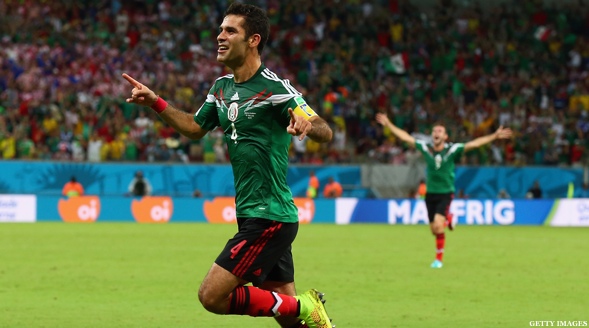Just as Mexico's World Cup hopes teetered and tottered the past few years, so did those of Rafael Márquez.
After a stirring seven-year stint with Barcelona, the super-talented and somewhat temperamental star finished a disastrous turn in the MLS in 2012. His time with the New York Red Bulls was marred by injuries and in-fighting -- he only played in half of his team's games during his three seasons -- and he left the Big Apple with a bad taste in his mouth.
Márquez was left off the national team roster for several friendlies in the lead-up to the World Cup, and it was only Victor Manuel Vucetich, Mexico's third coach in 2013, who invited Márquez back to the squad.
After struggling mightily during qualifying, 'El Tri' barely earned a trip to Brazil. Normally a shoo-in, Mexico had to defeat New Zealand in a playoff for one of the final spots in the tournament.
But now the team is shining, and Márquez has played no small part in his country's success. Márquez opened the scoring in his team's crucial group-stage victory against Croatia with a header in the 72nd minute. He assisted Javier Hernández on the team's final score in the 3-1 victory.

Márquez's goal makes him the first Mexican player to score in three consecutive World Cups.
Perhaps even more impressive is that Márquez is once again wearing the captain's armband for his country. According to the New York Times he is the first player in the tournament's 84-year history to captain his squad at four World Cups.
“He’s a man with experience and a man who knows how to talk with us,” defender Miguel Layún told the Times. “It’s really important, the job he has at this World Cup.”
Márquez is a fluid player who has helped out in the midfield and in attacking set pieces. His versatility makes him invaluable for a team that has gone through significant flux over the past year. But perhaps his most significant contribution to this team may be his leadership. Having seen Mexico through three World Cups, Márquez knows what to expect from the biggest stage.
And now the 35-year-old is tasked with his biggest challenge of all. In this, likely his final tournament, his team drew defending runner-up Netherlands in the round of 16. If Mexico want to advance past the round of 16 for the first time since 1986, it'll have to do so by taking down the hottest team in the tournament.





